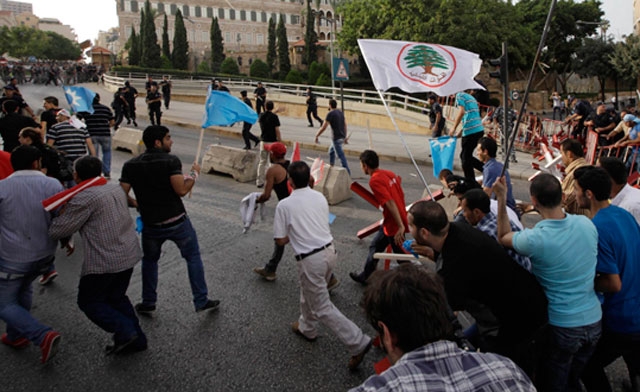The United States Ambassador in Lebanon made several visits to March 14 figures last week, specifically after the political and security escalation the latter attempted to do.
United States Ambassador in Lebanon made several visits to March 14 figures last week, specifically after the political and security escalation the latter attempted to do.
According to Al-Akhbar newspaper, last weeks’ events closed the file on ousting PM Najib Miqati’s government, and urged each of March 14’s elements to review their approaches, “and the main idea they came out with was that they involved themselves in political and security conflicts at the wrong time”.
As Al-Akhbar considered that the surprise on Lebanese Forces Chief Samir Geagea’s face is clear, it quoted people close to him as saying that “he lived moments of political shock after US Ambassador Maura Connelly’s visit on the 23rd of this month, in which she asked about Saudi Intelligence Chief Bandar bin Sultan’s phone call to Gaegae hours after the press conference he held when Wissam Al-Hasan was assassinated.”
“Geagea assured to her that the phone call did happen, telling her bitterly that he (Bandar) blamed him and said he was expecting from Geagea to take more escalatory stances against the government,” the paper said.
For her part, Connelly responded: “The Qataris are more realistic in their policies than the Saudis. Because of that they are able to play a role in Lebanon and even in Palestine. We should all be aware that it is prohibited to oust Miqati’s government if there was no alternative.”
“It is also prohibited to shake stability in Lebanon during the current regional situation, specifically in Syria,” she added, warning that “no part could bare the responsibility of such a development.”
 Al-Akhbar continued that “Connelly also asked MP Walid Jumblatt not to play all his cards in approaching the current situation… she also addressed Geagea saying: You could keep your relation with Saudi Arabia on the external level, but be realistic in politics.”
Al-Akhbar continued that “Connelly also asked MP Walid Jumblatt not to play all his cards in approaching the current situation… she also addressed Geagea saying: You could keep your relation with Saudi Arabia on the external level, but be realistic in politics.”
“You and Jumblatt should boycott Saad Hariri’s rashness,” Al-Akhbar said Connelly concluded.
In parallel, on the eve of Connelly’s visit to Geagea, the Future party, headed by Fuad Siniora was trying to keep its allies’ spirits high by refuting the effects of the five ambassadors’ stance that supported the government to avoid political vacuum, the Lebanese daily indicated, noting that it focused on two points in doing that. The first was by referring to US Foreign Minister Hillary Clinton’s statement that demanded “an affective government that takes the right measures,” and the second considered that EU Representative Catherine Ashton did not support Miqati’s government but rather supported stability under any government.
On another hand, the Lebanese daily quoted Connelly as saying, during her comment on the Lebanese situation, that “indicators favor Barack Obama’s success in the presidential elections,” and that “the Syrian crisis will last long, because the American approach will not change fundamentally. This requires preserving the Lebanese statico, and Lebanon should live with that and avoid shaking it.”
In this context, well-informed sources told Al-Akhbar that Connelly was not the only one that informed March 14 about the danger of betting on Syrian changes, as the Lebanese presidential palace has also received an official letter from Moscow, assuring that the latter is now even more strict in its stance on the Syrian crisis.